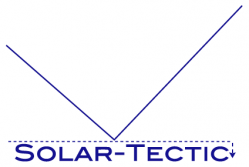Solar-Tectic LLC (“ST”) announced a breakthrough OLED display technology that promises to revolutionize the industry by replacing the standard LTPS (low temperature polysilicon) process used world-wide by the major display manufacturers and thereby solving the industry’s “backplane problem.”
LTPS is a process central to the manufacture of thin-film transistors (TFTs) used in AMOLED displays (Active Matrix Organic Light Emitting Diodes), LCD (liquid crystal) displays, and micro-LED technologies. Yet LTPS is lacking in several respects, such as current, uniformity and scale-up for larger size displays.
The new process, which Solar-Tectic is calling “LT1CS” or “Low temperature single crystal silicon” emphasizes the single crystal-like silicon quality, which arises from the highly oriented c-axis aligned or “textured” silicon crystals. LTPS in contrast uses polycrystalline silicon. It is well known that oriented or aligned crystalline thin-films perform much better than polycrystalline thin-films on many levels. In addition, the new “LT1CS” process can achieve films with large grains or crystals which also enhance performance in the backplane of displays. Electron mobility in textured, aligned thin silicon films would be higher than in IGZO (indium gallium zinc oxide) which is another contender to replace LTPS, and uniformity in the LT1CS technology would also be better. Currently IGZO performance is lower than LTPS with regard to both electron mobility and uniformity. IGZO also consists of indium and gallium which are rare-earth elements. This could increase cost. ST’s LT1CS technology is similar to CAAC-IGZO, which is c-axis aligned IGZO. In a way, one could say that LT1CS does for silicon what CAAC-IGZO does for IGZO. ST’s technology, which includes III-V materials like GaN, could also be used in the emerging micro-LED (µLED), field which combines III-V materials with silicon thin-film transistors.
The highest quality TFTs in today’s market require fabrication on a quartz substrate due to the high temperatures necessary for the quality film growth. ST’s LT1CS technology is a low temperature process which means ordinary soda-lime glass can be used, saving costs of production.
The ST technology was recently patented (see US patents 9,054,249 B2; US 9,722,130 B2; and US 8,916, 455 B2). Relevant papers have also been published demonstrating the core technology (see “Highly textured silicon (111) crystalline thin-film on buffered soda-lime glass by e-beam” and “Textured (111) crystalline silicon thin film growth on flexible glass by e-beam evaporation”). A patent has also recently been granted for III-V/silicon thin-film LEDs and transistors (see US 9,818,964). A press release was published regarding the latter technology, see https://www.prnewswire.com/news-releases/solar-tectic-llc-receives-patent-for-iii-v-thin-film-tandem-high-performance-solar-cell-and-led-technology-300527576.html. All told, ST display technologies promise to offer emissive, high luminance, and high efficiency devices.
The technology was invented by the late Dr. Praveen Chaudhari, renowned materials physicist, and recipient of the US National Medal of Technology, and Ashok Chaudhari, CEO of Solar-Tectic LLC.
Solar-Tectic LLC specializes in high quality inexpensive thin-film solutions for the solar, display, and glass industries.
For licensing, investment, or general inquiries, please contact H. Thomas Davis, Jr. of Carter Ledyard & Milburn LLP [email protected]

